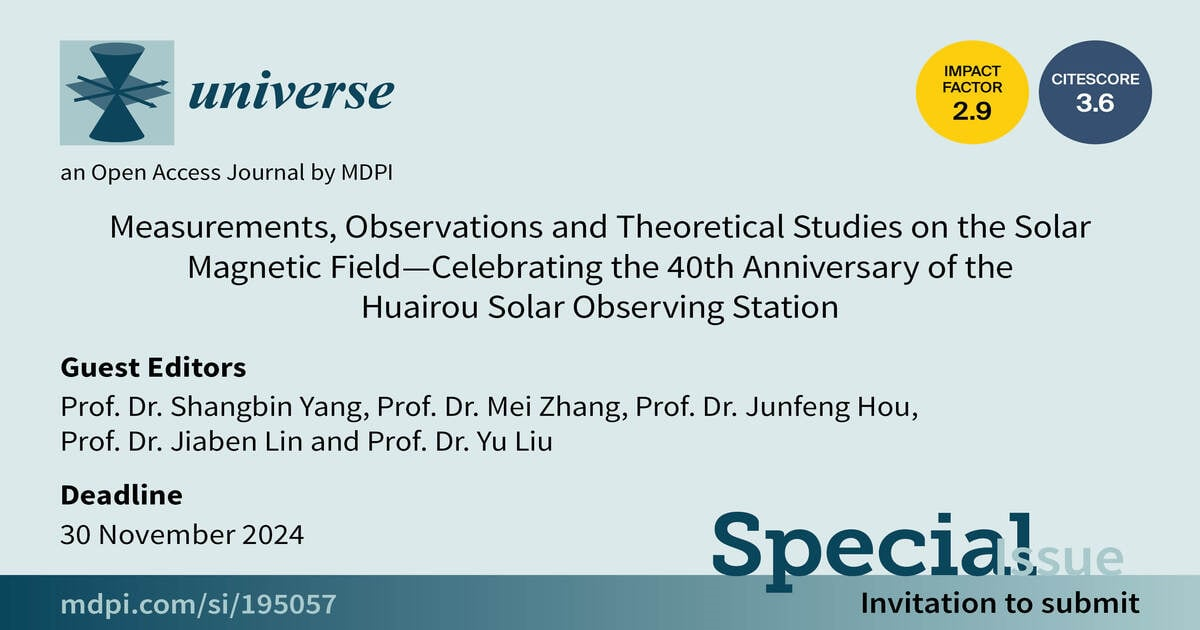Measurements, Observations and Theoretical Studies on the Solar Magnetic Field—Celebrating the 40th Anniversary of the Huairou Solar Observing Station
Dear Colleagues,
The magnetic field in astrophysical plasma was first discovered by Hale in 1908 from the solar sunspots through the Zeeman effect. Since then, it has been gradually realized that solar magnetic fields drive the solar radiation, solar wind, energetic particles, and coronal mass ejections (CMEs), allowing the so-called weather of space to significantly affect the modern human society and push forward to understand the activity of the Universe in the new era of multi-messenger astronomy. The Huairou Solar Observing Station (HSOS) was founded in 1984 by Academician Prof. Ai Guoxiang and has been observing the solar magnetic field for 40 years. In those years, a series of advanced solar magnetic field measurement technologies and instruments have been invented in HSOS, such as the Multiple Channel Technology Telescope (MCT/SMCT/SFMM), full-disk ground/space magnetograph (SMAT/FMG), AIMS working at a middle-infrared wavelength, etc. Based on these long-time stable and high-quality solar magnetic field measurements, a series of impactful research work has been conducted focusing on areas such as the chromosphere magnetic field, helicity of the solar cycles, modeling relative magnetic helicity in solar corona and its role in solar eruption, solar activity in multiple wavelength and long-time evolution, etc.
To celebrate this anniversary and utilize the summary and perspective of the current and future solar magnetic field measurements and research, the scope of this Special Issue is to address these topics as a multidisciplinary field of research, important for its diversified areas of solar magnetic field measurements, observation, and theoretical research.
This Special Issue welcomes contributions on the following topics:
• Solar magnetic field measurements;
• Solar polarimetry;
• Spectro-polarimetric inversion;
• Multi-wavelength solar observations;
• Modelling the solar magnetic field from chromosphere to interplanetary space;
• Topological analysis for the solar magnetic field;
• Data-driven MHD models;
• Solar Dynamo;
• Space weather and forecasting models;
• Astroinformatics in solar physics;
• Long-term historical solar observations;
• Current and future space/ground solar telescope projects.
While we expect many contributions from participants for the 40th anniversary of the Huairou Solar Observing Station (https://sun.bao.ac.cn/anniversary40th/), we also welcome original and high-quality relevant manuscripts from all scientists working on the above-mentioned topics.
Manuscript Submission Information
Manuscripts should be submitted online at www.mdpi.com by registering and logging in to this website. Once you are registered, click here to go to the submission form. Manuscripts can be submitted until the deadline. All submissions that pass pre-check are peer-reviewed. Accepted papers will be published continuously in the journal (as soon as accepted) and will be listed together on the special issue website. Research articles, review articles as well as short communications are invited. For planned papers, a title and short abstract (about 100 words) can be sent to the Editorial Office for announcement on this website.
Submitted manuscripts should not have been published previously, nor be under consideration for publication elsewhere (except conference proceedings papers). All manuscripts are thoroughly refereed through a single-blind peer-review process. A guide for authors and other relevant information for submission of manuscripts is available on the Instructions for Authors page. Universe is an international peer-reviewed open access monthly journal published by MDPI.
Please visit the Instructions for Authors page before submitting a manuscript. Submitted papers should be well formatted and use good English. Authors may use MDPI's English editing service prior to publication or during author revisions.
We look forward to receiving your contributions.
Shangbin Yang, Mei Zhang, Junfeng Hou, Jiaben Lin, Yu Liu

